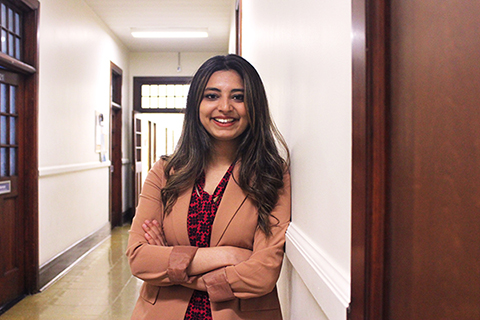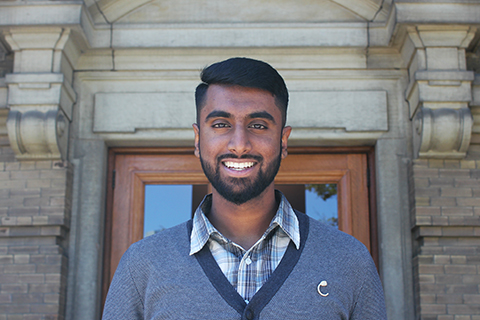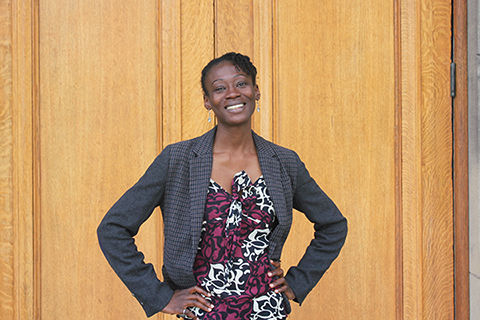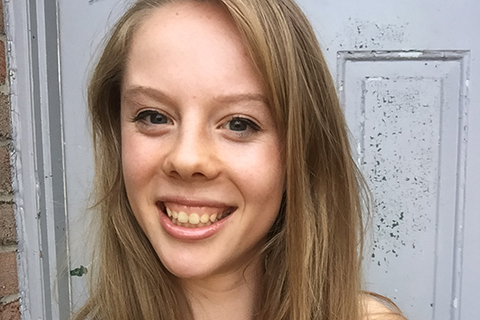June 12, 2017 – On Tuesday, June 13, MIE is proud to graduate a new class of engineers who aim to change the world. Here are just a few of the amazing grads of 2017:
Amreen Poonawala
I am industrial engineering graduate, pursuing a career in consulting. I have been involved in numerous organizations including MIE Ambassadors, Women in Science and Engineering (WISE) and the Ismaili Students Association (ISA). From research to government to corporate, I have also had diverse work experiences. I also enjoy dancing and have performed at international competitions.
What do you hope to accomplish upon graduation?
Upon graduation, I will be joining Accenture’s management consulting practice where I look forward to applying my problem-solving skills to strategy and implementation projects across various industries. I have also been fortunate to lead projects within the Ismaili community and hope to inspire others to get involved in volunteering their time and knowledge to better society.
How will you use your engineering degree to make a difference, or to contribute to society?
My long-term goal is to volunteer for the Aga Khan Development Network (AKDN) and use my engineering and consulting skills to solve large-scaled complex problems related to global poverty, education and healthcare. U of T Engineering not only teaches you the technical capabilities that you need to thrive in the world but also the leadership skills that are imperative in creating a positive impact!
What advice would you give students coming into their first year at MIE in September?
Balance. MIE has an incredible support system that allows you to succeed academically but also from an extra-curricular perspective. Being involved in student clubs will truly help you become a strong leader, better team player and an organized person. MIE also has amazing professors who are conducting ground-breaking research. My advice for first-years would be to learn more about research opportunities that MIE has to offer.
How does it feel to now be a part of the U of T Engineering alumni community?
I feel very fortunate to be a member for the U of T Engineering alumni community. I was recently awarded the Gordon Cressy Award which made me reflect on my leadership experience. I realized that giving back to the community doesn’t stop here. Thanks to the alumni network, students get scholarships, advice, knowledge and mentorship. I look forward to contributing to this legacy.
Describe your MIE student experience in one word.
Transformative!
Never had I ever imagined that going to Canada’s best engineering school would mean balancing my academic and extracurricular life. MIE at UofT taught me how to dream big from day 1. It made me realize that I had the potential to make a difference and positively impact those around me, whether it was through being President of WISE and encouraging girls to pursue engineering or volunteering at an MIE Spring Reunion event.
What have been the highlights of your academic career at MIE?
MIE has an incredible curriculum that allows students to find their passion, whether it is business or healthcare engineering. I have received over 15 awards/scholarships including the MIE Award, NSERC, Joffrey Skoll BaSc/MBA Scholarship and President’s Scholars of Excellence Award. I did my undergraduate thesis on factors affecting mobile banking with Professor Chignell and partnered with TD Bank to continue the research for my capstone.
Looking back on your time here, do you have any people you’d like to thank?
His Highness The Aga Khan has always been a role model. I thank him for his leadership that inspires me to always keep learning and giving back to the community. I would also like to thank my parents, Amin and Amina Poonawala who have sacrificed a lot, moved countries and have always supported and guided me. My MIE experience would not have been this rewarding without the mentorship of Dean Cristina Amon, Professor Mark Chignell, Professor Mariano Consens and my mentor, Vinay Verma. Last but not the least, special shout out to Kendra Hunter, Shannon Osborne and the rest of the MIE staff for always being supportive!
Vinoj Suthakaran
Outside of engineering, I am a poet and performing artist under the stage name, Voice of Silence, an active member in the community – whether it is for supporting the local arts or for community service, and a person who enjoys gaining new experiences in different fields and connecting with people.
What do you hope to accomplish upon graduation?
Now that I have reached the end of my five-year journey in the undergraduate mechanical engineering program, I hope to continue following my passions, both in engineering and in performing arts, while being open to any new passions that may arise in the years to come. Ultimately, I want to be able to bridge these all together in some manner, as there are many similarities between the world of art and the world of engineering. Currently, I am diving into the workforce to gain more knowledge and experience in systems relating to mechatronics while simultaneously trying to launch a startup that addresses technological gaps performing artists face today through The Entrepreneurship Hatchery at the University of Toronto.
How will you use your engineering degree to make a difference, or to contribute to society?
In the long-term, I envision myself working for myself and creating a platform (whether through a line of products or services) that will open up the possibilities for performing artists, from music to theatre, to take their live performances to new heights. Being a fan of the arts more than being an artist myself, I want to utilize my engineering degree to create more engaging and interactive experiences for the audience and allow artists to do the same through the use of simple and intuitive technology.
What advice would you give students coming into their first year at MIE in September?
Don’t be afraid to explore the possibilities of what you can do with an engineering degree, and don’t be afraid to try something new and different. Through U of T Engineering, you can find many opportunities to grow in a manner that is tailored to you and your passions.
How does it feel to now be a part of the U of T Engineering alumni community?
I am still in slight disbelief that I am here. Even though it has been five years, it also feels that the time flew by. I feel honoured and proud to be part of such a diverse community that is ever-growing and making impacts in society in many different ways. I am also looking forward to opportunities to give back to U of T Engineering in whatever capacity I can.
Describe your MIE student experience in one word.
Growth-filled.
What have been the highlights of your academic career at MIE?
Some of the highlights during my academic career at MIE include being able to tackle design projects from start to finish, such as designing and building a maze-solving robot and designing a braking system for the proposed Hyperloop project. These design projects allowed me to reflect on my learning growth throughout the engineering program, as each course helped me develop my mindset to approach engineering problems and improved my learning skills for new concepts. Through these projects, which were often completed in groups, I was able to use my creative side to develop innovative solutions, while improving my collaborative and communication skills.
Looking back on your time here, do you have any people you’d like to thank?
My overall experience in MIE was truly enhanced by the strong presence and openness of the Department in addressing student matters and improving the student experience in a timely manner. I would like to sincerely thank everyone in the MIE Department for their dedication and commitment to listening to our voices and working with us rather than for us, as it goes a long way and is appreciate by many of us!
Edem Dovlo
My doctoral research has been on the design and development of photoacoustic radar (PAR) and ultrasound imaging systems with adequate system sensitivity, spatial resolution and signal-to-noise ratio for improving early cancer diagnosis and care. Achieving PAR functionality on a commercial (widely used) Ultrasound imager could accelerate its clinical acceptance and use.
What do you hope to accomplish upon graduation?
The significance of my work in co-registering ultrasound (US) and phase-filtered PAR images is its direct relevance to clinical diagnosis, as the first PAR-US co-registered modality completely based on a commercial US imager. The novelty of the wavelength-modulated differential PAR modality for functional imaging is its definitive imaging criterion for identifying tumor malignancy as it indicates the accumulation of early onset of angiogenetic blood and hypoxia in a tumor region. The projected outcome is a clinical ultrasound imager equipped with a compatible photoacoustic radar accessory.
I often regard my work as a stepping stone to providing some part of a solution to an issue that has touched many of our lives. My hope is to work collaboratively with industry (projecting my achievements in solving practical problems for industry) and continue my research in the fields of photoacoustics and ultrasound, as well as new areas in translational biomedical engineering.
How will you use your engineering degree to make a difference, or to contribute to society?
My hope upon graduation, is to continue applying the skills I have acquired throughout my postsecondary education and work both here in Canada and my native country, Ghana to give back to society and hopefully, help improve the lives of others. I have been able to pursue overseas (field) opportunities as a Project Manager at 1Room (Kenya), a community-focused project using an innovative education model that leverages technology and evidence to make high-quality schooling affordable and accessible underserved populations, which allowed me to apply and further develop and strengthen these skills in international development. I am eager to incorporate the expertise acquired in my combined experiences to my future endeavours. I am confident that this background will help me not only in my engineering career but also provides a basis to contribute to community development.
What advice would you give students coming into their first year of graduate studies at MIE?
My experience at MIE has been greatly shaped by the people here. Having an experienced and knowledgeable supervisor who challenges his students and treats us with respect is a key part of
that. As a doctoral student, I think of myself, in essence, as an apprentice of my supervisor; learning the ropes in becoming a competent scientist and researcher of high quality. I can, therefore, not stress enough the importance of a good relationship with one’s supervisor. I have also met colleagues from all walks-of-life who are involved in some very inspiring work in other research areas in the department through my involvement with student groups like the Association of Mechanical and Industrial Engineering Graduate Students (AMIGAS). Many of whom I’ve been privileged to connect and share many laughs and fun times with. I am often reminded of the bigger picture in working to help improve society while spending time and sharing ideas with them; providing adequate and hopefully lasting, sustainable solutions to real-life problems.
My take-away: Seize the opportunity to engage and get involved… you might be surprised by the enduring connections you make. What an experience you will have! Take it all in. Enjoy it!
Describe your MIE student experience in one word.
Humbling. The more I learn, the more I realize how much more there is to discover.
What have been the highlights of your academic career at MIE?
I was fortunate to have an experienced and supportive supervisor and supervisory committee who showed great interest in my research and freely shared their expertise and objective feedback with me. I have also had the opportunity of learning a great deal in terms of my research area from senior lab members who were kind enough to share their experiences with me. Working collaboratively with researchers and clinicians with expert knowledge in their disciplines has paved the way for the development of useful and novel methodologies in achieving project goals. There was no lack of inspiration, with faculty and colleagues involved in innovative, world-class research in their respective research areas. Working as a researcher provides avenues to critically analyze problems from various perspectives and formulate enduring solutions. Though challenging, my experiences in diverse areas of research and industry have solidified my interest in research, further developed my problem solving, critical thinking and leadership abilities, and built my confidence in my capacity to expand my scope of research and succeed in new disciplines as well.
Looking back on your time here, do you have any people you’d like to thank?
I am immensely grateful to my supervisor, Dr. Andreas Mandelis whose support and guidance have been invaluable throughout my Doctoral degree. Thank you for all the insightful discussions and feedback that helped shape my comprehension and grasp of the subject matter. I’d also like to thank the Graduate office, Operations, External Relations & Communications support
staff who have greatly enriched my experience at MIE (and U of T). I have appreciated their dedication, insight and flexibility as they have worked to enhance services in response to the diverse
needs of students.
Kate Lonergan
I am from North Vancouver, B.C., always game for a laugh, and live by “Carpe Diem”. At U of T, I’ve been an undergraduate TA, Co-Chair of the Council of Athletics & Recreation, athlete in the Varsity Blues family, and founded Blues Engineering.
What do you hope to accomplish upon graduation?
Upon graduation is the rest of my life, so I will hopefully accomplish lots! Short term, I am really looking forward to completing my MSc at ETH Zurich in Energy Science & Technology – and doing my best to learn German! With homework on pause for the summer, I am also excited to get in some good swimming, running, and cycling as I work my triathlon distance up to an Ironman 70.3. Longer term…you’ll just have to wait and see 😊
How will you use your engineering degree to make a difference, or to contribute to society?
Creating a human impact will, for me, come from living amongst the intersection of ideas. An engineering is an amazing degree because it endows a problem-solving mindset; while we mostly have practiced within our own disciplines, with a little bit of creativity, many of the same principles can be applied to other fields – and that, I think, is where the interesting, satisfying, and impactful work truly lies.
What advice would you give students coming into their first year at MIE in September?
Two critical things for first years. Firstly, be a good person. Who you are is more important than anything you could ever write on a resume. Secondly – exercise! Just like brushing your teeth, moving is something you should just probably do.
How does it feel to now be a part of the U of T Engineering alumni community?
Cathartic! My undergraduate experience was phenomenal, but it is time to move on to new challenges. I am really excited to see what kinds of amazing things my classmates accomplish by the time we have a reunion!
Describe your MIE student experience in one word.
Adventureful.
What have been the highlights of your academic career at MIE?
Honestly, my single biggest academic accomplishment was passing my first semester. I missed an entire month of school due to concussion before writing finals alongside my classmates. Nothing else in my undergrad was remotely as stressful! Further highlights definitely include taking classes with Prof. Y.-L. Cheng, Prof. Wallace, and Prof. Spelt because they helped me find the areas of engineering that I was both good at and enjoyed. Most recently, in what was probably the coolest field trip ever, I got to travel NASA Ames Research Centre with my friend and fellow Mech, Kevin Wang, and four of our ChemE classmates. See – things got better after first year!
Looking back on your time here, do you have any people you’d like to thank?
First and foremost, I’d like to thank my Mom, Dad, and sister, Dilma, for all of their encouragement, hugs, tough love, and willingness to take my phone calls. I would also like to thank my friends for being my role models, daily sources of inspiration, and personal comedians. Of these friends, I’d especially like to mention Maddy Mandryk, Michelle Brownrigg, and Carla Baptista for their pasta, patience, and faith. Finally, I’d like to thank all of the coaches who ever benched me or cut me from their teams for helping me learn to trust myself, to believe in my ambitions, and discover just how tough I am.
Sylvia Mwangi
I am an international student from Kenya. I pursued my studies at the University of Toronto through the generous scholarship from the MasterCard Foundation. I am passionate about using my Industrial Engineering knowledge and skills to spearhead international development in my own country particularly in the healthcare sector.
What do you hope to accomplish upon graduation?
I would like to gain work experience in a field where I can apply the Industrial Engineering skills and knowledge acquired, particularly on process improvement. I’m of the opinion that there are adequate resources and we just have to streamline the processes involved for efficiency.
How will you use your engineering degree to make a difference, or to contribute to society?
Engineers are known to be problem solvers, as such my contribution mainly comes from the brainstorming of potential solutions and turning ideas to action on how things can run better in the society. I don’t necessarily have one way in mind but I believe that in my everyday life I strive to make my society better whether in an engineering specific manner or not. However, I hope to find that niche where I can merge my academic background and diverse experience and design solutions that would assist in breaking barriers of access to opportunities, be it in the healthcare field or international development.
What advice would you give students coming into their first year in September?
First is that they ought to embrace failure and learn how to fail fast. And this is not limited to grades, but even as individuals. They are things in campus one doesn’t grasp immediately. Lastly, regardless of the rigour of engineering, a study-life balance is very possible, so they shouldn’t deny themselves that chance to create a holistic experience in first year.
How does it feel to now be a part of the U of T Engineering alumni community?
It feels great to be part of a larger community that is or was where am heading after graduation. Somehow the reality of graduating has not yet sank in as well as all that comes with it. However, am looking forward to the next steps after graduation.
Describe your MIE student experience in one word.
Enriching!
It’s been four years of gaining technical knowledge and skills but more than that, a chance to push myself to limits – see myself fail here and there and still make it to the end with a smile. A lot of personal growth, character and psychological growth, has taken place in addition to intellectual growth.
What have been the highlights of your academic career at MIE?
I would consider each day as a highlight. The ability to get out of bed and just do it. We all earn that senior class, and with that comes a lot of hard work behind the scenes. I came to appreciate that more in my senior years when I could trace that upward trajectory in my overall progress. So rather than highlight a single experience, each day for me was a win.
Do you have anyone you’d like to thank at MIE?
In retrospect, I had a chance to have meaningful interactions both with the faculty, staff and students. It’s impossible to name them all but I’m grateful to the professors who offered their time, were patient with me and helped me navigate my weaknesses, and those too who saw me struggle and I ended up just wanting to pass the courses. It’s only human to excel in some things and not in others. The staff at the MIE office were extremely helpful and helped me plan my academic journey and make adjustments where possible. My friends, though very few remain the pillar and it’s great to have had them around.




